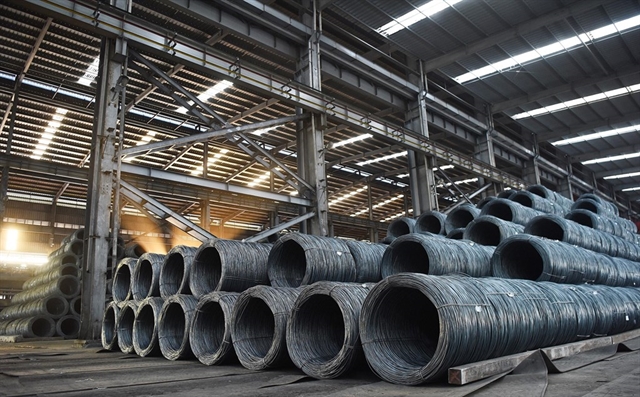 |
| Hot rolled coils (HRC) in storage at a facility in the northern province of Hà Nam. VNA/VNS Photo |
HÀ NỘI Appropriate and timely trade measures, following Việt Nam’s and World Trade Organization (WTO) regulations, will help the domestic steel industry minimise damage caused by unfair competition practices and protect local production, said industry leaders and experts.
Earlier, the trade defence department, under the Ministry of Industry and Trade (MoIT), said it had received the detailed request for an anti-dumping investigation on hot-rolled steel (HRC) originating from China. The documents have been put under review by the ministry before a decision can be made on whether to proceed with the investigation.
Domestic steel makers said employing the right defence tools can help reduce difficulties and unfair competition and maintain production in the domestic industry.
They claimed during the first six months of 2024, more than 5.9 million tonnes of hot rolled coils (HRC) were imported into Việt Nam, an increase of 32 per cent compared to the same period last year and 1.7 times the total local industry’s output. Of these, HRC of Chinese origin accounted for nearly 74 per cent, with the average unit prices ranging from US$41 to $133 per tonne lower than those of other import markets.
Trade defence measures including anti-dumping and anti-subsidy are tools the WTO allows member states to use in protecting their domestic industries. Countries have the right to increase import taxes or apply certain import restrictions without violating WTO commitments or free trade agreements (FTAs) if it is determined that the increase in imports is causing, or threatening to cause, harm to the domestic industry.
Given the unprecedented difficult situation faced by the domestic steel industry, still in recovery after a bad year and the slow property market, the use of trade defence measures can provide domestic steel makers a lifeline, said Dr Hoàng Ngọc Thuận from the Foreign Trade University.
“If we apply trade defence measures at the right time, promptly, proactively and following the law, it will help domestic enterprises reduce competitive pressure from imported goods and avoid threats from unfair competition.”
Defence measures have been proven to be effective in the past. In 2017, the Southeast Asian country imposed an anti-dumping tax of 38.34 per cent on galvanized steel products imported from China and South Korea. After just a year of the tax, imports decreased from 19 million tonnes (2016) to 15 million tonnes (2017).
Last month, the ministry said it had started an investigation into the dumping of galvanized steel products from China and South Korea again after domestic makers reported alleged dumping activities.
Phạm Chí Cường, a former president of the Vietnam Steel Association (VSA) said in 2017, partly thanks to import taxes, the domestic galvanized steel industry developed rapidly, not only meeting domestic demand but also exporting to over 30 markets, including high-standard markets like the US and EU.
He said failing to implement trade defence measures can result in domestic plants, which are extremely expensive to build, scaling down or shutting down.
As major steel makers in the region including China, India, Japan and S Korea face excess production, dumping pressure is unlikely to ease soon.
Meanwhile, domestic steel makers have been struggling on the export front, facing increasingly stringent technical and defence measures. By the end of May this year, around 84 trade investigations by foreign authorities had been launched against Vietnamese steel products.
“We encourage the application of trade defence measures for domestic steel products that fully meet domestic demand. For products that do not yet meet demand and still depend on imports, the overall benefits need to be considered to make appropriate decisions,” said Nguyễn Thị Thu Trang, Director of the WTO and Integration Center from the Vietnam Chamber of Commerce and Industry (VCCI).
In the first six months of 2024, Việt Nam imported up to 8.12 million tonnes of various types of steel, worth $5.9 billion, increasing by 46.1 per cent and 24 per cent respectively compared to the same period. Steel product imports were valued at over $3 billion, up 23.7 per cent. Total steel and steel product import expenditures reached $8.9 billion. VNS
- Reduce Hair Loss with PURA D’OR Gold Label Shampoo
- Castor Oil Has Made a “Huge” Difference With Hair and Brow Growth
- Excessive hair loss in men: Signs of illness that cannot be subjective
- Dịch Vụ SEO Website ở Los Angeles, CA: đưa trang web doanh nghiệp bạn lên top Google
- Nails Salon Sierra Madre
 VnExpress News The News Gateway of Vietnam
VnExpress News The News Gateway of Vietnam




